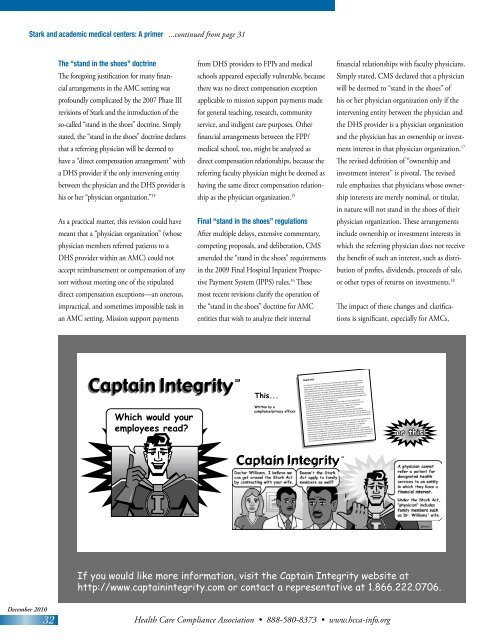Steven Baruch - Health Care Compliance Association
Steven Baruch - Health Care Compliance Association
Steven Baruch - Health Care Compliance Association
You also want an ePaper? Increase the reach of your titles
YUMPU automatically turns print PDFs into web optimized ePapers that Google loves.
Stark and academic medical centers: A primer ...continued from page 31<br />
The “stand in the shoes” doctrine<br />
The foregoing justification for many financial<br />
arrangements in the AMC setting was<br />
profoundly complicated by the 2007 Phase III<br />
revisions of Stark and the introduction of the<br />
so-called “stand in the shoes” doctrine. Simply<br />
stated, the “stand in the shoes” doctrine declares<br />
that a referring physician will be deemed to<br />
have a “direct compensation arrangement” with<br />
a DHS provider if the only intervening entity<br />
between the physician and the DHS provider is<br />
his or her “physician organization.” 14<br />
As a practical matter, this revision could have<br />
meant that a “physician organization” (whose<br />
physician members referred patients to a<br />
DHS provider within an AMC) could not<br />
accept reimbursement or compensation of any<br />
sort without meeting one of the stipulated<br />
direct compensation exceptions—an onerous,<br />
impractical, and sometimes impossible task in<br />
an AMC setting. Mission support payments<br />
from DHS providers to FPPs and medical<br />
schools appeared especially vulnerable, because<br />
there was no direct compensation exception<br />
applicable to mission support payments made<br />
for general teaching, research, community<br />
service, and indigent care purposes. Other<br />
financial arrangements between the FPP/<br />
medical school, too, might be analyzed as<br />
direct compensation relationships, because the<br />
referring faculty physician might be deemed as<br />
having the same direct compensation relationship<br />
as the physician organization. 15<br />
Final “stand in the shoes” regulations<br />
After multiple delays, extensive commentary,<br />
competing proposals, and deliberation, CMS<br />
amended the “stand in the shoes” requirements<br />
in the 2009 Final Hospital Inpatient Prospective<br />
Payment System (IPPS) rules. 16 These<br />
most recent revisions clarify the operation of<br />
the “stand in the shoes” doctrine for AMC<br />
entities that wish to analyze their internal<br />
financial relationships with faculty physicians.<br />
Simply stated, CMS declared that a physician<br />
will be deemed to “stand in the shoes” of<br />
his or her physician organization only if the<br />
intervening entity between the physician and<br />
the DHS provider is a physician organization<br />
and the physician has an ownership or investment<br />
interest in that physician organization. 17<br />
The revised definition of “ownership and<br />
investment interest” is pivotal. The revised<br />
rule emphasizes that physicians whose ownership<br />
interests are merely nominal, or titular,<br />
in nature will not stand in the shoes of their<br />
physician organization. These arrangements<br />
include ownership or investment interests in<br />
which the referring physician does not receive<br />
the benefit of such an interest, such as distribution<br />
of profits, dividends, proceeds of sale,<br />
or other types of returns on investments. 18<br />
The impact of these changes and clarifications<br />
is significant, especially for AMCs,<br />
Stark Act<br />
The Stark Act, 42 U.S.C. § 1395nn, is one of the most complex statutes, including<br />
interpretive regulation, that prohibits a physician from referring to a designated<br />
health entity if the physician has a financial arrangement with such entity.<br />
Designated health services include the following: clinical laboratory, physical and<br />
occupational therapy, radiology, radiation therapy and supplies, durable medical<br />
equipment, parenteral and enteral nutrition, prosthetics orthotics and prosthetic<br />
devices, home health, outpatient prescription drugs, and inpatient and outpatient<br />
hospital. Further, financial arrangements include both compensation arrangements<br />
and investment or ownership arrangements.<br />
If a physician has a compensation arrangement with an entity that bills for<br />
designated health services, the physician cannot refer to such entity unless the<br />
arrangement meets all components of an exception. There are numerous<br />
exceptions that apply to the Stark Act, some of which apply only to<br />
investment/ownership arrangements, some that apply only to compensation<br />
arrangements, and some that apply to both ownership/investment arrangements<br />
and compensation arrangements. Each financial arrangement will need to be carefully<br />
analyzed to make sure that either the Stark Act does not apply, or all components of an<br />
applicable exception are met.<br />
Complicating such arrangements further, physicians, under the Stark Act, include all of<br />
the following family members related to the physician: husband or wife; birth or<br />
adopted parent, child, siblings; stepparent, stepchild, stepbrother, or stepsister;<br />
father-in-law, mother-in-law, son-in-law, daughter-in-law, brother-in-law or<br />
sister-in-law; grandparent or grandchild; and spouse of a grandparent or grandchild.<br />
Thus, even if a designated health service entity, like a hospital, is not contracting directly<br />
with a physician, the Stark Act may be implicated if the party with whom the hospital is<br />
contracting is related to a referring physician. The restrictions imposed by the Stark Act<br />
are not eliminated, therefore, merely by contracting with a family member of a .<br />
If you would like more information, visit the Captain Integrity website at<br />
http://www.captainintegrity.com or contact a representative at 1.866.222.0706.<br />
December 2010<br />
32<br />
<strong>Health</strong> <strong>Care</strong> <strong>Compliance</strong> <strong>Association</strong> • 888-580-8373 • www.hcca-info.org

















